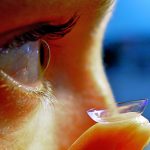Five Reasons Not to Be Afraid of LASIK
Written by Dr. David Evans Last modified on May 9, 2019
I receive a lot of questions about the risks and side effects of LASIK from people considering the procedure. I have consulted on many FDA clinical trials related to LASIK and have lent my expertise to many other studies over the years. In terms of efficacy, the results speak for themselves. Yet my experience is that fear of LASIK remains one of the biggest impediments for patients considering the surgery.

Just like any other surgical procedure, there are risks with LASIK, including infection or an imperfect outcome. However, continued improvements in the technology and surgical skill have greatly reduced instances of side effects, limiting risk and helping to address the fear factor for many patients. Here are five things to think about to help address LASIK fear.
1. Speedy Recovery
Recovery time for LASIK is minimal (or nonexistent). Your vision should be greatly improved without glasses or contact lenses immediately after surgery.
2. Risk Screening
Today’s screening techniques for potential risks are extremely accurate. The most common risks associated with LASIK are large pupils, dry eye and thin corneas, all of which can be directly evaluated and diagnosed with today’s high tech equipment.
3. Armed Forces and NASA Approved
The procedure has been found to be extremely safe and effective, and is now approved for Armed Forces members, including Navy SEALS and NASA astronauts.
4. Patient Experiences
More than 15 Million procedures have been successfully performed worldwide.
5. Minimal Discomfort
One of the biggest fears is simply the idea of having surgery on the eye. Most patients say that they experience little-to-no pain or discomfort during the procedure.
LASIK isn’t right for everyone. If you are fearful or concerned about LASIK surgery, convey these fears with your surgeon. Together you can address your concerns and establish if the treatment is right for you.
(Read more about LASIK surgery)




